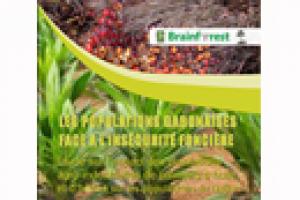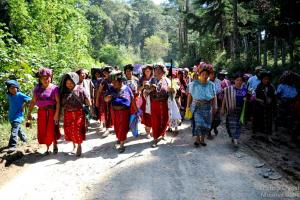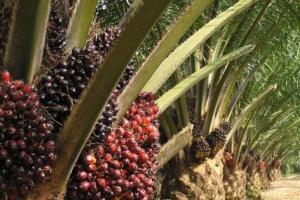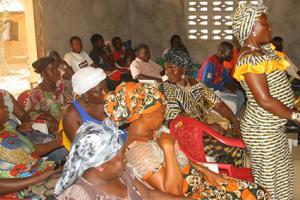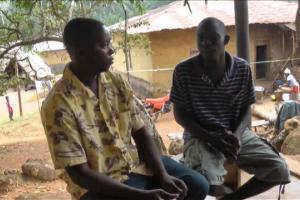Only available in French
By Franck Ndijimbi.
Large-Scale Tree Plantations
Industrial tree plantations are large-scale, intensively managed, even-aged monocultures, involving vast areas of fertile land under the control of plantation companies. Management of plantations involves the use of huge amounts of water as well as agrochemicals—which harm humans, and plants and animals in the plantations and surrounding areas.
Publications
2 March 2013
Bulletin articles
27 February 2013
We are once again approaching March 8, the international day of women’s struggle, on which we, as feminist women, also struggle against the commodification of nature. This commodification is deepened by the expansion of green deserts, which are portrayed as a step in the transition to a so-called Green Economy. This is a process based on false environmental solutions for a system in crisis, but which is, in fact, aimed at creating economic opportunities for the integration of nature into the market.
Bulletin articles
27 February 2013
The three leading Liberian civil society organizations Sustainable Development Institute (SDI), Save My Future Foundation (SAMFU), and Social Entrepreneurs for Sustainable Development (SESDev) released a statement on January 31, 2013, calling for a review of Liberia’s agricultural policy. Since 2006, the Government of Liberia has entered into binding contracts – known as concession agreements – with three major oil palm producing foreign investors: Sime Darby (Malaysia), Golden Veroleum (Indonesia), and Equatorial Palm Oil (UK).
Bulletin articles
27 February 2013
The Singapore based agribusiness giant Wilmar - is expanding its operations in Africa. It already has approximately 50,000 hectares of oil palm plantations in Ivory Coast, Uganda and Ghana. More recently it has expanded to Nigeria going into a joint venture with PZ Cussons to set up huge extensions of oil palm plantations in Cross River State in the south east region of the country while promising the creation of thousands of job opportunities.
Bulletin articles
27 February 2013
Tropical rainforests cover 85% of the total land area in Gabon. They are home to an immense diversity of species, on which some 300,000 people depend for their survival, through hunting, gathering, fishing and small farming.
Bulletin articles
27 February 2013
The Garwula District, in Grand Cape Mount County, is one of the areas affected by the 63-year lease agreement signed by the Malaysian giant oil palm producer Sime Darby with the Government of Liberia in 2009. When the company established large scale export-oriented oil palm plantations the livelihoods of the local residents were disrupted, and women have had to cope with many difficulties.
Other information
27 February 2013
“Live or drive, a choice has to be made”, a case study of Sime Darby operations in Liberia, basta! and Friends of the Earth France, athttp://www.bastamag.net/IMG/pdf/Rap_LiberiaEN.pdf
Other information
27 February 2013
“Environmental crime: in pursuit of palm oil industry”, video on the business of palm oil in Liberia
Bulletin articles
30 January 2013
In this issue of the WRM Bulletin we analyze the large-scale generation of energy from wood biomass. This is a new trend which, particularly in the European Union, involves the ever increasing use of wood as a means to meet “renewable energy” targets.
What was initially portrayed as an environmentally friendly way to take advantage of waste wood has rapidly turned out to be another large-scale process that requires growing consumption of wood. It has also led to the emergence of new energy market commodities, such as wood chips and wood pellets.
Bulletin articles
30 January 2013
Biomass is the oldest energy source used by humans. It is found in abundance in almost every part of the planet and today, more than two billion people depend on it for cooking, heating and lighting, particularly in the countries of the global South. Energy produced from biomass is called bioenergy.
Other information
30 January 2013
On January 29, 2013, at about 4:30pm, a protest of peasants was violently repressed in South Sumatra by the Regional Police. About 25 people were beaten and arrested, peasants and also three activists including Anwar Sadat, Director of WALHI South Sumatra, the main environmental NGO of the country.
Please help release Anwar and the other arrested people by signing the On Line Petition: www.change.org/ReleaseAnwar
Other information
30 January 2013
Brazil’s Landless Workers Movement (MST) has announced, “We are beginning the year 2013 with several struggles, which represent MST’s response to the irresponsibility of governments. If we do not fight for agrarian reform, which is currently at a standstill, and for the punishment of murderer Adriano Chafik, who killed five landless workers and remains at large eight years later, it would be as if we ourselves were all dead.”
